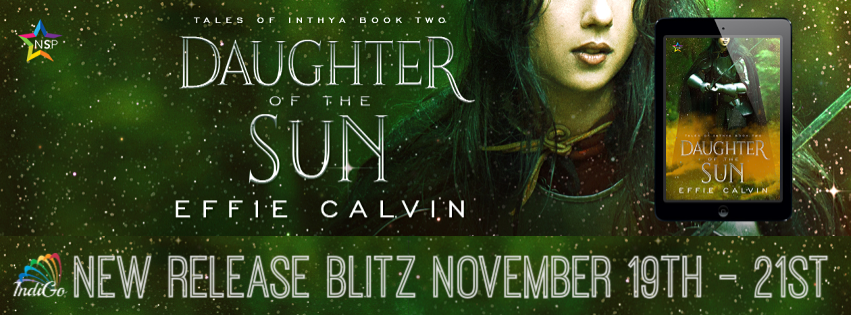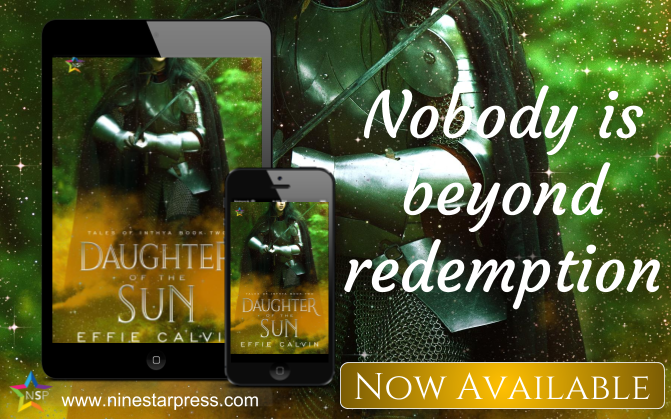
Title: Daughter of the Sun
Series: Tales of Inthya, Book Two
Author: Effie Calvin
Publisher: NineStar Press
Release Date: November 19, 2018
Heat Level: 1 - No Sex
Pairing: Female/Female
Length: 71900
Genre: Fantasy, LGBT, fantasy, pansexual, gods, romance
Add to Goodreads

Synopsis
Orsina of Melidrie is a paladin of the
Order of the Sun, sworn to drive out corruption and chaos wherever she finds
it. She has been ordered to leave her home and travel around Vesolda in search
of a great evil she is supposedly destined to destroy. But after two years of
fighting monsters and demons and evil gods, she does not seem to be any closer
to her goal—or ever returning home.
Aelia is the Goddess of Caprice, the
personification of poor decision-making. The Order of the Sun has classified
her as a chaos goddess, meaning that her worship has been outlawed. During a
run-in with Orsina, she is trapped in a mortal body, rendering her unable to
leave Inthya.
Aelia is found by Orsina again, but this
time Orsina does not recognize her in her new body. So Aelia pretends to be a
mortal woman who is fleeing an abusive family. Aelia plans to use Orsina as
protection as she hunts down the magical relic that will free her from her mortal
body.
As Aelia and Orsina grow closer to one
another, Aelia wrestles with her own desire to tell Orsina the truth about who
she is, and her fear that Orsina will turn on her if she does. But the decision
might not be hers after all, because their actions have not gone unnoticed by
Aelia’s siblings.
Excerpt
Daughter of the Sun
Effie Calvin © 2018
All Rights Reserved
Even from a distance, Orsina of Melidrie
could tell something was wrong.
The little village of Soria appeared to
be a typical Vesoldan farming community. A field of green barley stretched
toward the south, almost ready for the springtime harvest, and the farmers
raised their hands to Orsina in greeting as she rode past. Down in the olive
groves, trees were beginning to put out tiny, cream-colored blossoms while
Sorian youngsters rested beneath the branches and tended to flocks of fat
sheep.
But when Orsina inspected the fields
more closely, she saw the crops were choked with weeds and beginning to rot. It
was as though they had been neglected for weeks, despite the presence of the
farmers.
Orsina also didn’t fail to notice that
all Soria’s sheep still wore their heavy winter coats, though all the
surrounding communities had held their springtime shearing days nearly a month
ago. Most passersby would probably not notice such small details, but Orsina
had dealt with situations like this before. She knew the signs of a village in
thrall.
According to storytellers, the correct
attire for a paladin was heavy plate armor, and a matching set for her horse.
Orsina supposed none of those storytellers ever visited southern Vesolda, for
even in early spring it was too hot to even contemplate wearing anything
heavier than her chain mail and tabard.
Still, when she rode into Soria,
children dropped their toys in the dust and abandoned their games to follow
her. She doubted any of them had seen a paladin before, and so she gave them
warm smiles and tried her best not to look intimidating. She did not know how
successful she was.
A temple of Eyvindr, God of the Harvest
and Third of the Ten, stood at the center of town. But as Orsina rode past, she
noted that the windows were dark and the orange trees in the garden were
beginning to wither. Despite her curiosity, she did not linger there.
Orsina dismounted in front of the tavern
and tied Star, the gray Vesoldan mare that had been her mount for the last four
years. The children were upon her in a moment, asking thousands of questions
simultaneously. Was she a paladin? Was she from the Order of the Sun? Had she
ever spoken to Iolar? Or one of the other gods? Was she from Bergavenna? Had
she ever killed a dragon? A demon? A chaos god?
Orsina answered the questions as best
she could, but she wasn’t even sure if the children heard her replies. Finally,
a man stepped out onto the front steps of the tavern, drawn by the noise.
“Here, leave the poor woman alone!” he
yelled to the children. “Go on, back to your chores. Get!”
The children backed away reluctantly,
and Orsina gave the man a grateful smile. He smiled back, but she could see the
tension in his shoulders and the fear in his eyes. He did not want her here.
“Do you have a room?” asked Orsina. “I
was hoping to stay the night.”
“Just the one. It’s not much, though,”
he glanced at her armor. “Count Doriano’s manor is only a day’s ride from here.
If you hurry, you might be there before dark, and not have to sleep on a straw
mattress—and don’t tell anyone I said so, but his wine is better, too.”
“I have endured worse than straw
mattresses,” said Orsina pleasantly, wondering if the man would outright refuse
to serve her. But instead, he turned back and yelled into the tavern.
“Benigo!” he called. “See to the Dame
Paladin’s horse, and bring her bags upstairs.”
A young child, probably the man’s son,
rushed out to take Star’s lead. Orsina let him do his work and went inside.
The tavern was nearly empty, save for a
few old grandfathers sharing stories. When they saw her, their conversations
ended abruptly. Orsina looked around, taking in the ancient wooden furniture
and dust collecting in the corners. Open windows let in the midday sunlight,
and a massive empty stone fireplace took up the entire north wall.
“It is an honor, Dame Paladin,” said the
tavern-keeper, speaking too loudly as he moved around the back of the bar and
fumbled for a tankard. “What brings you to Soria?”
The question was innocently posed, the
sort of question anyone might ask a strange traveler. But it was well known
that paladins from the Order of the Sun were forbidden to tell lies. The
tavern-keeper wanted to know how much she suspected, how much she knew.
The old men were all watching her as
well, their filmy eyes locked on her.
“I am in search of a prophecy,” said
Orsina. “Two years ago, my Baron, Casmiro of Melidrie, received a vision from
Iolar. I was informed that Iolar meant for me to leave Melidrie immediately and
defeat a great evil. I obeyed, of course, and have been in search of it ever
since.”
The tavern-keeper looked uncomfortable.
“And you believe that evil is here?” he asked uneasily, his eyes darting back
to the old men.
“I do not know,” admitted Orsina.
“Unfortunately, the Baron’s vision was sparsely detailed. I have destroyed many
evil creatures in Iolar’s name since I left home, but never have I received a
vision telling me that my quest was complete. While I am proud of all that I have
accomplished, I admit I will be glad when I am finished.”
“But you believe there is evil here?”
the tavern-keeper pressed.
Though her vows forbade her to lie, even
Iolar could understand the occasional need to be obtuse. “There is evil
everywhere, sir,” she said. “But we are only vulnerable to it when we tell
ourselves otherwise.”
Purchase
NineStar Press | Amazon | Smashwords | Barnes & Noble | Kobo





No comments:
Post a Comment